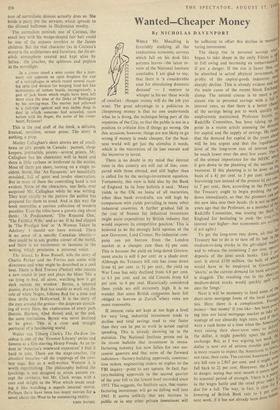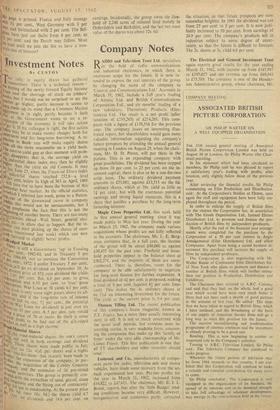Wanted—Cheaper Money
By NICHOLAS DAVENPORT
WHILE Mr. Maudlin is feverishly studying all the tendentious economic surveys which fall on his desk like autumn leaves—the latest re- view of the National Institute concludes, I am glad to say, that there is 'a considerable case for stimulating domestic demand' — I venture to whisper in his ear these words of comfort: cheaper money will do the job you want. The great advantage to a politician in cheapening money is that no one understands what he is doing, the technique being part of the mysteries of the City, so that the public is not in a position to criticise him if things go wrong. On this occasion, however, things are not likely to go wrong if money is made cheaper, for the busi- ness world will get just the stimulus it needs, which is the restoration of its lost morale and the incentive to invest.
There is no doubt in my mind that interest rates in this country are still out of line, com- pared with those abroad, and still higher than is called for by the savings-investment equation. Fortunately, this view is held also by the Bank of England. In its June bulletin it said : 'Many yields in the UK on loans of all maturities, other than bank overdrafts, are still high by comparison with yields prevailing in many other industrial countries. A further gradual fall in the cost of finance for industrial investment might assist expenditure by British industry that would improve its competitive position.' This is believed to be the strongly held opinion of the new Governor, Lord Cromer. No industrial com- pany can yet borrow from the London market at a cheaper rate than 61 per cent. This is because the yield on long-dated GOvern- meat stocks is still 6 per cent. or a shade over. Although the Treasury bill rate has come down from 64- per cent. to 31 per cent., the yield on War Loan has only declined from 6.8 per cent to 6.1 per cent. and on old Consols from 6.6 per cent. to 6 per cent. Historically considered these yields are still extremely high. It is no wonder that some British corr4ipanies have felt obliged to borrow in Zurich where rates are more reasonable.
If interest rates are kept at too high .a level for very long, industrial investment tends to decline and total savings tend to rise faster than they can be put to work in actual capital spending. This is already showing up in the statistics. The National Institute points out in its recent bulletin that investment in manu- facturing industry has now fallen for two suc- cessive quarters and that none of the forward indicators—factory-building approvals, construc- tion orders, engineering orders or replies to the FBI inquiry—point to any upturn. In fact, fac- tory-building approvals in the second quarter of the year fell to the lowest level recorded since 1953. This suggests, the Institute says, that manu- facturing investment will go on falling well into 1963. It seems unlikely that any increase in public or in any other private investment will
be sufficient to offset this decline in man04 turing investment. The sharp rise in personal savings whieh began to take shape in the early Fifties is 3 in full swing and becoming an embarrasstne if not a danger. If the rise is faster than be absorbed in actual physical investment, profits of the capital-goods industries in° sharply decline. This is already evident and the main cause of the recent Stock Exahati slump. The natural course is to meet a Per. sistent rise in personal savings with a fail interest rates, so that there is a better chanej of the savings being put to work quicklY employment maintained. Professor Sayers, e!, Radcliffe Committee, has been taking UP into' point in a recent article assessing the denial'5 for capital and the supply of savings. He think; that the demand for capital in the years ahes will be less urgent and that the 'equilihrhilo level of the long-term rate of interest sh°u.5 be much lower over the next few years. This I of the utmost importance for the NEDC When it gets down to the planning of the national vestment. If this planning is to be done on that, basis of a 4+ per cent. to 5 per cent. industri , borrowing rate instead of the present 61 per eca,,r1 to 7 per cent., then, according to the Profess the Treasury ought to begin pushing the down immediately, so that the planners the new idea into their heads. (It is not so mailhe years ago that the Professor, as a member of t,f Radcliffe Committee, was teasing the Bank 1,, England for hesitating to push the lona-ierl., interest rate higher—but economists are nainia' if not agile.) To get the long-term rate down, all that toll° Treasury has to do is to turn off its 'tap' in to medium-to-long stocks in the gilt-edged mar and to release the remaining 2 per cent. sPecl,r, deposits of the joint stock banks. This 2 ' cent. is about £150 million, the bulk of whim would have to be employed in Governin"ea 'shorts,' as the current demand for bank advan"0., is sluggish. The resulting' rise in the short t,,r medium-dated stocks would quickly spin °``
into the 'longs.'
ta- Next it will be necessary to fund some ° short-term mortgage loans of the local antiwar, ties. Here there is a complication. forelar, money—'hot money' if you like—has been P°ajj, ing into our local mortgage market to take,:ere vantage of our absurdly high rates, and if tn,
ica were a rush home at a time when the Amer",
fen° were raising their short-term rates to de the dollar, it might possibly upset the Writhe exchange. But, as I was arguing last weckaicre ' dollar is now out of serious trouble and is more reason to expect the Americans to loose'ri;, not raise, their rates. The current Arnerican T1 (0 ury bill rate is 2.867 per cent, and it might fall back to 21 per cent. Moreover, the is 0 in danger, seeing that next month it enters Lirti"4 its seasonal period of strength. There is in the wages battle and the retail price indfe:r
due for a fall. The way, in fact, is clear ,
CCfli lowering of British Bank rate to 4 per1'e next week, if it has not already been done hef° th,,,!s Page is printed. France and Italy manage 1111 3i per cent., West Germany with 3 per and Switzerland with 2 per cent. The Bel- t.ans have just cut theirs from 4 per cent. to ,w‘ Per cent, and the Dutch may follow. Must • ,e. ,v'ait until we join the Six to have a non- is rate of interest?































 Previous page
Previous page